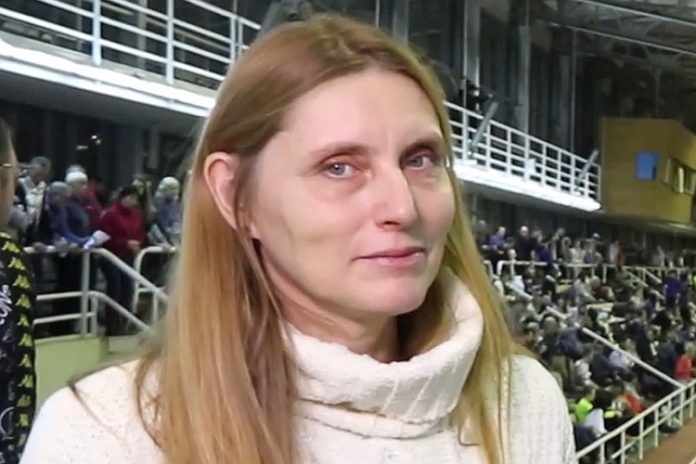(★ Friends: The costs for services to support this site continue to come in, so please donate here if you would like to assist. Your help is so very much appreciated. ★)
● Plus: Paris 2024: Worries over crowd control and security at Stade de France after UEFA Champions League Final fan debacle = Los Angeles 2028: World Skate wants scooter or inline skating or both added = Deaflympics: Vendors unpaid as organizers ran out of money = Athletics: Sprinter Richardson’s “abuser” revealed and talks = Ice Hockey: IIHF wants 3×3 hockey as future Winter Games event = Skiing: FIS chief Eliasch pushing change, but national federations are pushing back = Swimming: U.S. butterfly star Dahlia retires at 27 = Volleyball: U.S. star setter Poulter loses Olympic gold to car theft = AT THE BUZZER: India’s Batra removed by Delhi High Court as NOC President ●
News, views and noise from the non-stop, worldwide circus of Olympic sport:
≡ SPOTLIGHT ≡
The drama over Berlin 1936 Olympic high jump gold medalist Cornelius Johnson’s Olympic oak tree at his family’s former home at 1156 South Hobart Street in Los Angeles continues on multiple fronts.
The home – with the tree still standing tall – was sold by the Johnson family in 1994, and then again to the current owner in 2019, who had plans made to replace the house and the tree with a four-unit townhouse.
But the normal development process has been upended by the tree and the widening interest in preserving it. On Thursday, the Los Angeles Cultural Heritage Commission will hold a preliminary hearing “to determine whether to take the proposed designation of a Monument under consideration” for the former Johnson Family home and the oak itself.
If the Commission agrees, a more in-depth hearing will be held later. Rina Rubenstein, the Communications Director for the West Adams Heritage Association explained:
“We’re pretty hopeful that the city will agree about the importance and uniqueness of the Olympic Oak, although there is a chance that recent changes to California housing law may preclude further efforts to stop the development plans. The next challenge will be to find a way to purchase and sensitively reuse the property. …
“The tree undoubtedly requires serious conservation efforts as well, and besides the purchase price, any project would probably require significant funding. But the first step is the preliminary hearing this Thursday.”
The presentation to the Cultural Heritage Commission will be made by Susan Anderson of the California African American Museum, and artist Christian Mayer, who were working in parallel with the West Adams Heritage Association, and then joined forces on the research, with both submitting documentation to the Commission.
The Los Angeles Department of City Planning staff report recommended that the Commission take the property under consideration for Monument designation, noting that it “appears to be one of the earliest extant residences built and lived in by an African American family in Los Angeles. …
“Cornelius Cooper Johnson (1913-1946), planted in the rear yard an oak tree he was gifted by the German government after winning a [high jump] gold medal in the 1936 Summer Olympic games in Berlin. Cornelius resided at the subject property until 1945, one year prior to his passing, and the Johnson family continued to live at the residence until it was sold in 1994. The oak tree is one of 25 known remaining oaks worldwide that the German Olympic Committee presented to all 129 gold medalists at the 1936 Olympics.”
Two other 1936 Olympic Oaks were brought to Los Angeles, both to USC: one survives and one died and was replaced; both are memorialized with special plaques.
A 28 May update posted on esotouric.com stated that “the LA84 Foundation and Los Angeles Neighborhood Land Trust are fundraising in hopes of buying the property, which presumes the property owner who failed to care for the tree while struggling to find a buyer for the proposed redevelopment site will sell to them.” Great concern for the health of the tree was noted.
The next step comes Thursday. Rubenstein added:
“Comments are welcome, and can be emailed to [email protected]. Any communication should reference the case number: CHC-2022-3207-HCM. … [E]ven brief expressions of support are extremely welcome.”
≡ THE 5-RING CIRCUS ≡
● Games of the XXXIII Olympiad: Paris 2024 ● Considerable concern about the crowd-control problems and the 36-minute delay in Saturday’s UEFA Champions League final at the Stade de France outside of Paris.
There are claims and counterclaims about what happened, including a statement from French authorities of thousands of fake tickets that caused unnecessary crowding to get in on the Liverpool side of the venue. The BBC reviewed a series of incidents which contributed to the mess, including a train line which was out of order so many more fans were concentrated at a single exit stop, local muggers and pickpockets who were attacking spectators, multiple searches of spectators that slowed everything down and an unprepared, overwhelmed police presence.
The French Ministry of Sports met on Monday “[t]o identify very precisely the dysfunctions with UEFA, the French Football Federation, the Stade de France, the Paris Police Headquarters, the Seine-Saint-Denis Prefecture and the town hall of Saint-Denis” in order to “draw all the lessons to prevent such incidents from happening again for our future major international sporting events.”
The FrancsJeux.com site noted the differences between a football final between Real Madrid and Liverpool and the 2024 Games:
“The public, first. Football has never really been able to contain the outbursts of supporters, inside and outside the stadium. The Olympic Movement has never known any. It’s hard to imagine groups of fans trying to climb the gates of the Stade de France or another competition site to attend, without a ticket, an athletics session or a handball final.
“Second difference: the preparation. LREM-Renaissance deputy Aurore Bergé recalled it on Sunday May 29 on RMC: France organized ‘in barely three months’ a final of the Champions League initially planned in Russia, in Saint Petersburg.”
But it’s a warning, no doubt.
● Games of the XXXIV Olympiad: Los Angeles 2028 ● While the jockeying to be one of the added sports for the LA28 Games is ongoing, sports already on the program are lobbying to add new events and add athletes, which will have to be subtracted from some other sport to meet the 10,500-athlete quota.
One of the sports looking to flex its newly-found muscles is Skateboarding, which has been incorporated into the LA28 sports list already. Skate debuted in Tokyo with popular events in Park and Street for men and women, which included several 13-year-old girls.
Now, Francesco Zangarini (ITA), sports director at World Skate, told Agence France Presse last week:
“We are currently discussing with the International Olympic Committee. Our DNA is an advantage because it’s an urban DNA, and with the help of host cities like Los Angeles (2028) or Brisbane (2030), we have a good chance of having other sports in the future.
“There are millions of young people around the world and it has exploded since last year. This is the reason why the scooter could be recognized by the Olympic Movement. We have already presented it to the IOC and we have already talked about Los Angeles with them.”
Scooter as a competition event is not as well developed as inline skating, another possibility for World Skate and a discipline with a long background – especially in the U.S. – including as the outdoor equivalent of speed skating and a favorite of American stars like Brittany Bowe and Joey Mantia.
These are just two of dozens of proposals for added events for Los Angeles from the 28 already agreed-on sports; the actual program won’t be completely finalized until after the Paris 2024 Games are concluded.
● XXIV Deaflympic Games: Caxias do Sul 2022 ● “The Deaflympics, which ended last Sunday (15th) after two weeks of competitions in Caxias do Sul, Rio Grande do Sul, cannot pay suppliers.
“The event did not receive financial support from the federal government, despite being used politically by it.”
That’s from the Brazilian site, UOL.com.br, reporting that the organizing committee has apparently run out of money and that vendors are looking for payment anywhere they can.
“The financial situation, which was already difficult, became unsustainable. A hotel in Caxias do Sul even opened a police report against [organizing committee chief Richard] Ewald, claiming that, of the R$470,000 combined [~$98,866 U.S.], only R$200,000 was paid [~$42,071 U.S.]. The hotel, which hosted South Korea, threatened to withhold travelers’ luggage if the amount was not paid. The report found that several hotels did not receive payment, as well as companies in areas such as food and event broadcasting.”
A report is due on 3 June, detailing the financial situation. The UOL story emphasized that most of the event revenue came from entry fees and that sponsorship marketing was well below expectations.
Brazilian politics were heavily involved in the Deaflympics, which the government wanted to see in Rio de Janeiro, using the 2016 Olympic facilities. But for political reasons within the International Committee of Sports for the Deaf (ICSD), the event was placed in Caxias do Sul, a city of 517,000 in southern Brazil. Held from 1-15 May, it had 2,349 athletes from 71 countries participating in 226 events in 18 sports.
Covid issues plagued the Games and the Japanese delegation withdrew with five days left to avoid further exposure to the virus after 10 athletes and one official tested positive, blaming the organizers for not having enough money to provide sufficient countermeasures.
● Russia ● Concern in Russia that it will be barred from the Paris 2024 Games is rising. Said Russian Foreign Ministry Spokeswoman Maria Zakharova on Saturday:
“The desire to remove Russian athletes, who have become hostages of the political ambitions of the United States and its allies, from participation in the Olympics is a gross violation of their rights. Thomas Bach‘s clearly biased and politicized decision contradicts IOC statutory documents, the Olympic Charter, and UN General Assembly resolutions on sports.”
Zakharova was commenting on IOC President Bach’s statements that Russian entry Paris 2024 qualifying competitions will depend on the political situation (i.e., the war against Ukraine). There is considerable worry, and good reason for it.
● Athletics ● U.S. sprint star Sha’Carri Richardson advised her followers in mid-May on Instagram that she had been in an abusive relationship with a Jamaican hurdler that derailed her return to stardom after being banned for a month last summer for marijuana use that kept her off of the U.S. Olympic Team.
Her abuser turned out to be Jamaican star Janeek Brown (PR: 12.40 in 2019), the 2019 NCAA champ for Arkansas. In an Instagram interview, Brown said:
“I was abusive once that there’s physical evidence of. And we moved on, and even after then I was trying to move on from that, we still got nowhere. …
“We just keep on fighting, blaming each other and the regular relationship problems.”
Richardson returned to competition in May, and had a good outing at last weekend’s Prefontaine Classic, finishing second in the women’s 100 m to double Olympic champ Elaine Thompson-Herah in 10.92, equal-6th on the world list for 2022.
● Ice Hockey ● “The framework of what will be a new Strategic Plan was presented to the IIHF membership under the brand ‘ICE26′. It will operate with three goals: Innovate, Collaborate, Expand.”
Amid the 2022 men’s World Championship in Finland, the International Ice Hockey Federation met for its annual Congress and unveiled its plan for the 2022-26 timeframe. Stakeholder surveys, including with fans, demonstrated enthusiasm for more innovation, further development in women’s hockey and in grassroots programs.
The commonly-heard theme of “digital transformation” was heard, along with environmental concerns and raising the profile and importance of the IIHF’s top events. Look for 3-on-3 ice hockey – included in the 2020 Youth Olympic Winter Games – as a new discipline and brand, with its own tournament schedule and as a possible Olympic Winter Games event.
The bottom line, per IIHF Council member Anders Larsson (SWE):
“We must grow the game but how do we do it? We need to reach more players and fans through stronger member national associations and more offerings by building a targeted development program for the member’s growth and success. The path looks different for each of you.”
● Skiing ● In June 2021, Johan Eliasch (SWE), the chief executive of the HEAD Sport, was elected as the President of the Federation Internationale de Ski with 65 votes out of 119 on the first ballot.
He was re-elected last week, unopposed, but with 47 of the 117 delegates at the FIS Congress walking out in protest. In an interview with the Associated Press, Eliasch noted:
“I was elected FIS President with a clear mandate for change including that FIS should be a federation for all our members. …
“I think everybody realizes that it would be bad for them to be seen to stand in the way of change. We will get through this.”
Eliasch wants to bring all of the marketing and media rights to the federation’s World Cup events in-house, rather than the multi-party arrangements which have been in place for many years. That has national federations, event operators, already-contracted broadcasters and FIS’s right-holding joint venturer for the last 13 years, Infront Sports & Media, concerned. But not Eliasch:
“The longer we wait, the more we miss out.”
● Swimming ● “Thank you swimming [hearts icon] this sport has given me all I could dream and more, and I’m so thankful for my last 20 years in the water. The people I have met along the way are what have made the blood, sweat, and tears all worth it.”
With that at the top of an Instagram post last Saturday, U.S. star butterfly swimmer Kelsi Dahlia has retired from competitive swimming at age 27. She was one of the world’s best Fly swimmers, winning an Olympic gold in 2016 on the U.S. 4×100 m Medley team as a prelims swimmer after winning the U.S. Olympic Trials and reaching the Olympic semifinals in the 100 m Fly.
Dahlia won eight World Championships medals (5-1-2), with seven relay medals and a bronze in the 100 m Fly in 2017. She also won the World 25 m Championships gold in the 100 m Fly in 2018 among 15 career Short-Course Worlds medals (10-4-1), mostly on relays.
She finishes ranked no. 13 all-time in the 100 m Fly – and no. 4 U.S. – at 56.20 from 2017 and as American Record holder and no. 13 all-time in the 50 m Fly at 25.48, also in 2017.
● Volleyball ● Lock your car and close your garage. Or you may lose an Olympic gold medal as American Olympic volleyball setter Jordyn Poulter did last Wednesday.
The Los Angeles Times reported that Poulter “had parked the rental car in her garage on Wednesday afternoon and went inside to shower and get ready for a Zoom meeting, leaving the car unlocked and the garage door open.
“When she came back later, she saw that someone had rummaged through the car and taken the black shoulder bag that held her passport, which she had left on the passenger seat. The center console, where she had left the gold medal, sat open and empty.”
Poulter and her teammates won the U.S.’s first-ever gold in women’s volleyball last summer in Tokyo. She reported the theft to Anaheim police, and is hopeful that the medal will be returned. As she told reporters last week at the team’s practice facility, “It’s not pure gold, so if you try to melt it down, it’s not going to get you very far. The inside is made of recycled computer parts and then plated. So it’s not worth much in that sense.”
≡ AT THE BUZZER ≡
Anyone who observes the Olympic Movement for even a short time is amazed by the collection of offices that certain individuals seem to obtain, in multiple sectors and seemingly without any concerns over conflicts of interest.
One such multi-office holder was Indian Olympic Association President Narinder Batra, who is also the President of the International Hockey Federation (FIH), and became an International Olympic Committee member in 2019 by virtue of his IOA Presidency.
But last week, the Delhi High Court removed Batra from his IOA post since his nomination for the position was based on his status as a “life member” of Hockey India. But:
“The Government of India cannot grant recognition to a [national sports federation] whose constitution is not in consonance with the [India] Sports Code. The posts of Life President, Life Member in the NSF are illegal so is the post of CEO in the Managing Committee. These posts are struck-down.”
IOA Senior Vice President Anil Khanna has replaced Batra as its acting head; Batra issued a statement that he will not seek re-election at the IOA and will concentrate more on his role at the FIH:
“At a time when world hockey is going through an essential development phase, with the promotion of Hockey5s, the creation of a new competition this year – the FIH Hockey Nations Cup – and the launch of fan-engaging platforms and activities, my role as President of the International Hockey Federation requires more time for all these activities.”
Batra has been a leading proponent of an India bid for a future Olympic Games, but will lose his IOC membership since it was linked to his IOA status. Now what of the bid?
You can receive our exclusive TSX Report by e-mail by clicking here. You can also refer a friend by clicking here, and can donate here to keep this site going.
For our updated, 620-event International Sports Calendar for 2022 and beyond, by date and by sport, click here!























